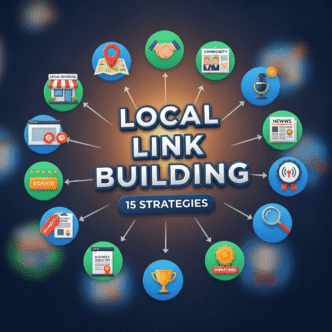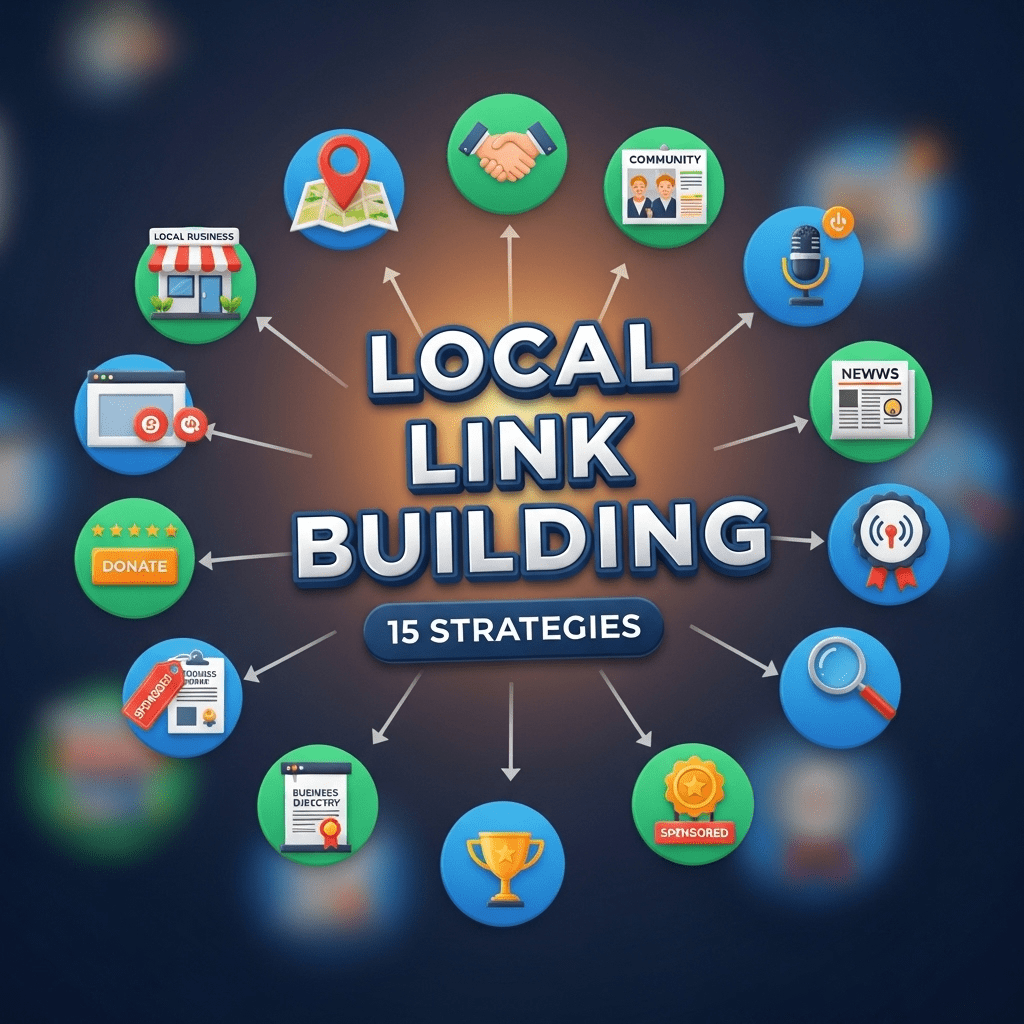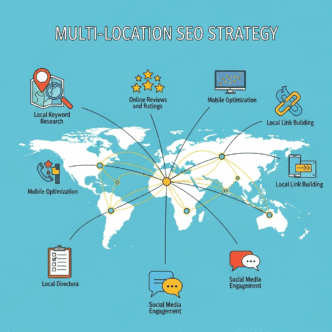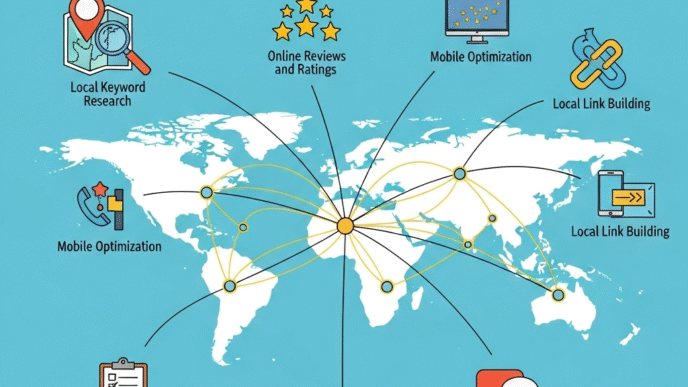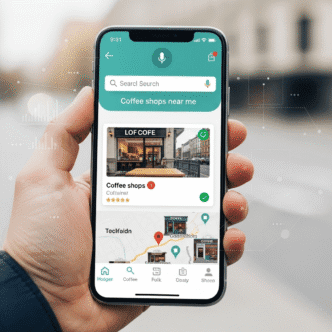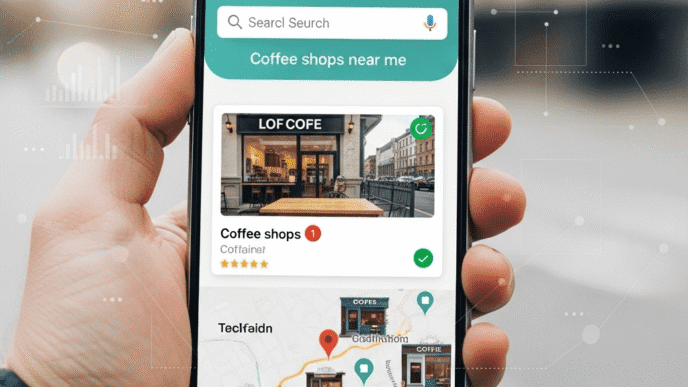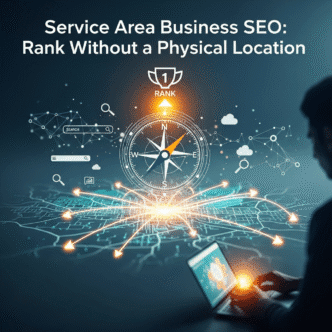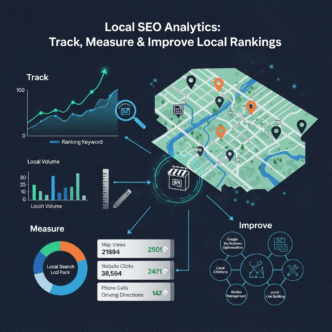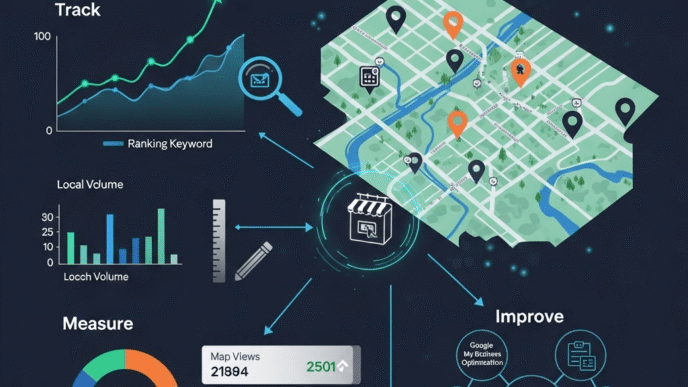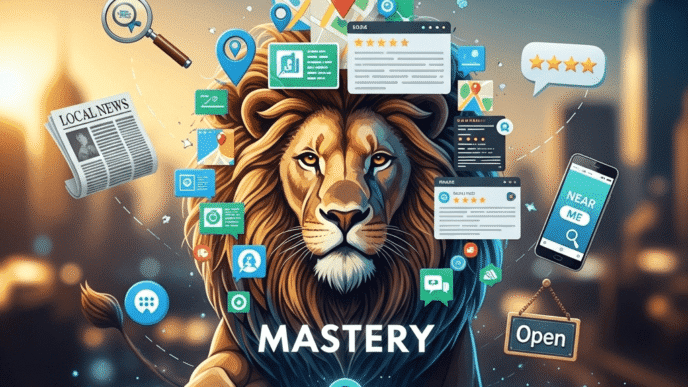Ever wonder why your competitor with the barely-functional website ranks #2 in local search while your beautiful, optimized site sits at #9?
Here’s what you’re missing: They have 47 backlinks from local news sites, chambers of commerce, community blogs, and neighborhood organizations. You have 3 links—one from your cousin’s blog, one from a directory you paid $50 for, and one from… well, you can’t actually remember where that third one came from.
Local link building is the secret weapon of businesses dominating local search. While everyone obsesses over Google Business Profile optimization and reviews, the businesses at the top quietly accumulate authoritative local backlinks that Google uses to determine who actually deserves those coveted top spots.
According to Whitespark’s Local Search Ranking Factors study, link signals account for 29% of organic local rankings and 13% of local pack rankings. But here’s the catch: not all links are created equal. A single link from your city’s newspaper website is worth more than 100 links from random business directories nobody’s heard of.
This guide reveals exactly how to build local backlinks for small business, the proven best local link building strategies 2025, and the specific tactics for earning links from local news sites, sponsorships, and community partnerships that your competitors are using to dominate local search.
Let’s stop playing nice and start building the local authority that makes you un-ignorable in your market.
Table of Contents
Toggle
What Makes Local Link Building Different from Regular Link Building?
Local link building focuses on acquiring backlinks from websites and organizations within your geographic area or serving your local market. It’s fundamentally different from national link building because you’re targeting relevance through location, not just topic authority.
Traditional link building chases high-domain-authority sites regardless of location. Local SEO backlinks prioritize geographic relevance—a link from a local blog with DA 25 can outperform a national directory with DA 50 for local rankings.
Why Do Local Backlinks Matter More Than You Think?
Local backlinks serve three critical functions for local SEO:
Authority transfer: Links pass “link juice” from the linking site to your site, boosting your domain authority and ability to rank.
Relevance signals: Links from local sites tell Google your business is genuinely connected to that geographic area, not just claiming to serve it.
Traffic generation: Unlike national links that rarely send clicks, local links drive actual customers who can physically visit your business.
Discovery and indexation: Local links help Google discover your location pages and understand your service areas more completely.
“Local links are validation. When the local newspaper, chamber of commerce, and neighborhood blogs all link to your business, Google sees you as an established part of that community. That geographic trust is nearly impossible to fake and incredibly valuable for local rankings.” — Marie Haynes, Search Engine Optimization Expert
Real-World Example:
Jessica owns a bakery in Charleston, SC. She spent $2,000 on a “link building service” that got her 150 backlinks—all from generic business directories in random countries. Zero ranking improvement. Then she spent $200 sponsoring a local 5K race, which got her:
- A link from the race website (local running community site)
- Mention in Charleston City Paper’s event coverage
- Link from the charity beneficiary’s website
- Shares on local running club social pages
Those 3-4 local links moved her from #8 to #3 for “bakery Charleston SC” in 45 days. The lesson: Local relevance trumps quantity every time.
For comprehensive context on how local link building fits into your complete local SEO strategy, check out our local SEO mastery guide.
Strategy 1: How Do You Get Featured in Local News and Media?
Earning links from local news sites is the holy grail of local link building. A single link from your city’s newspaper, local TV station website, or regional news blog carries immense authority and relevance.
What Makes a Story Newsworthy to Local Media?
Local journalists need content daily. Your job is to give them stories they can actually use.
Newsworthy angles for local businesses:
New location openings: “Local bakery expands to third location in historic downtown district”
Milestone anniversaries: “Family-owned plumbing business celebrates 50 years serving Charleston”
Community impact: “Local restaurant donates 1,000 meals to food bank during holiday season”
Unique services or innovations: “Charleston veterinarian first in state to offer cutting-edge cancer treatment for pets”
Local hiring or economic impact: “Tech startup creates 25 new jobs in struggling neighborhood”
Human interest stories: “Former teacher opens bookstore fulfilling lifelong dream after retirement”
Local awards or recognition: “Charleston chef wins regional culinary competition”
Expert commentary: Position yourself as the local expert media outlets call for quotes on industry topics
How Do You Pitch Local Journalists?
Step 1: Build a media list
Research and compile contacts for:
- City newspaper reporters (especially business/community beat)
- Local TV station news teams
- Regional magazines
- Community blogs and news sites
- Local radio stations
Step 2: Craft a compelling pitch
Email template that works:
Subject: Story idea: [Your newsworthy angle]
“Hi [Reporter Name],
I’m [Your Name], owner of [Business] in [Neighborhood]. I wanted to share a story that might interest your readers.
[One paragraph explaining the newsworthy angle and why it matters to the local community]
This could be a great fit for [specific section/column they write]. I’m happy to provide photos, interviews, or additional information.
Would you be interested in covering this?
Best, [Your Name] [Phone Number]”
Step 3: Make it easy for them
Provide:
- High-quality photos (journalists love visuals)
- Key facts and quotes pre-written
- Contact information for interviews
- Background information if needed
Step 4: Follow up (once) after 3-5 business days
Don’t be pushy. If they’re not interested, thank them and move on.
Pro Tip: The best time to pitch local news is Tuesday-Thursday mornings. Avoid Mondays (they’re catching up from the weekend) and Fridays (they’re winding down). Send pitches between 9-11am when journalists are planning their day.
Strategy 2: How Do You Leverage Local Sponsorships for Backlinks?
Local sponsorship link building opportunities are everywhere if you know where to look. Sponsorships provide dual benefits: community goodwill AND authoritative backlinks.
What Should You Sponsor for Maximum Link Value?
Youth sports teams and leagues:
- Little league baseball/softball
- Youth soccer leagues
- High school sports teams
Most youth sports websites list sponsors with links. Cost: $100-$500 per season.
Local charity events:
- 5K races and fun runs
- Charity auctions
- Fundraising galas
- Community festivals
Event websites almost always link to sponsors. Cost: $250-$2,000 depending on event size.
School programs:
- Theater productions
- Music programs
- STEM clubs
- Scholarship funds
Schools often create sponsor pages with links. Cost: $500-$5,000 for named scholarships.
Community organizations:
- Local chambers of commerce (membership includes directory link)
- Rotary Club, Lions Club, Kiwanis
- Business associations
- Neighborhood improvement associations
Arts and culture:
- Local theaters
- Art galleries
- Music venues
- Public art installations
Environmental initiatives:
- Park cleanups
- Tree planting programs
- Sustainability projects
How Do You Ensure Your Sponsorship Includes a Link?
When sponsoring, explicitly ask:
“Will sponsors be listed on your website? We’d love to have our business name linked to our website if possible.”
Most organizations are happy to do this—they want to thank sponsors publicly. If they don’t offer links automatically, simply ask.
Real-World Example:
Tom’s HVAC company in Denver sponsored:
- Youth soccer league ($300/season) = Link from league website (DA 28)
- Local 5K benefiting children’s hospital ($500) = Link from race site + mention in Denver Post article about race
- High school STEM program scholarship ($1,000/year) = Link from school website + feature in school district newsletter
Total investment: $1,800/year Links acquired: 5 high-quality local links Result: Moved from #6 to #2 for “HVAC repair Denver” and generated estimated $45,000 in additional revenue attributable to improved rankings.
ROI: 25x
Strategy 3: How Do You Build Links Through Local Partnerships?
Community-based link building tactics leverage partnerships with other local businesses and organizations for mutual benefit.
What Types of Local Partnerships Create Link Opportunities?
Supplier relationships:
If you buy from local suppliers, ask if they have a “customers” or “partners” page. Many B2B suppliers feature client logos and links.
Complementary businesses:
Partner with businesses that serve the same customers but aren’t competitors:
- Wedding photographer + wedding venue + florist
- Personal trainer + healthy restaurant + sports medicine clinic
- Real estate agent + mortgage broker + home inspector
Create joint resources, guides, or events that all partners link to from their websites.
Business association memberships:
Join local business groups:
- Chamber of Commerce (almost always includes member directory with links)
- Better Business Bureau (verified businesses get profile page with link)
- Industry-specific associations (local chapter websites often link to members)
Vendor/client testimonials:
Provide testimonials for:
- Software/tools you use
- Business services you’ve hired
- Products you love
Many companies feature customer testimonials on their websites with links back.
Cross-promotion with neighboring businesses:
If you’re in a shopping district or business park, create a “Local Businesses” resource page linking to neighbors. Ask them to reciprocate.
Pro Tip: Reciprocal links (you link to them, they link to you) aren’t as valuable as one-way links, but they’re not harmful either—especially when they’re relevant local businesses. Google understands that local business ecosystems naturally link to each other.
Strategy 4: How Do You Create Linkable Local Content?
Content that naturally attracts links is the foundation of sustainable local link acquisition.
What Types of Local Content Earn Links Naturally?
Local guides and resources:
- “Complete Guide to [Your City] Neighborhoods”
- “Best Parks in [City] for Family Outings”
- “Historic Sites and Hidden Gems in [City]”
- “Local Business Directory for [Neighborhood]”
Local bloggers, tourism sites, and community organizations link to comprehensive local guides.
Local data and research:
- Survey your customers about local preferences
- Compile local statistics
- Create neighborhood comparison data
- Analyze local trends
Original data is link bait. Local news sites especially love citing local statistics.
Local event calendars:
Create and maintain a comprehensive calendar of events in your area. Update it religiously. Other local sites will link to it as a resource.
Local expert roundups:
“15 [Your City] Business Owners Share Their Success Stories” “Local Experts Weigh In: Best Practices for [Relevant Topic]”
Everyone featured will share and link to the content.
Neighborhood profiles:
Deep-dive content about specific neighborhoods:
- History
- Demographics
- Best restaurants/shops
- Real estate market
- Schools
- Attractions
Real estate agents, relocation guides, and local blogs link to quality neighborhood content.
Interactive local maps:
Create useful maps:
- “Map of Dog-Friendly Restaurants in [City]”
- “Public Art Walking Tour Map”
- “Best Running/Biking Routes in [City]”
Visual, useful content attracts links naturally.
Real-World Example:
Sarah’s real estate agency in Austin created “The Complete Guide to Austin Neighborhoods” with detailed profiles of 25 neighborhoods including photos, school ratings, average home prices, and local attractions. She spent 40 hours researching and writing it.
Within 6 months:
- 17 local blogs and real estate sites linked to it
- Austin’s main online magazine featured it
- Her organic traffic increased 180%
- She generated 23 qualified buyer leads directly from the guide
The guide became her #1 marketing asset and continues attracting links years later.
Strategy 5: How Do You Use Local Citations to Build Links?
While citations (NAP mentions in directories) aren’t always links, many citation sources DO include links—and they’re relatively easy to acquire.
What Citation Sources Provide Actual Backlinks?
High-value citation sources with links:
- Google Business Profile (nofollow, but critical)
- Yelp (nofollow, but authoritative)
- Facebook Business Page
- Better Business Bureau
- Chamber of Commerce directories
- Yellow Pages (yp.com)
- Local.com
- MerchantCircle
- Manta
- Industry-specific directories
How to approach citations for link building:
Focus on citation sources that:
- Are indexed by Google (not all are)
- Provide dofollow links (more valuable, but nofollow links still help)
- Have actual users (not just SEO directories)
- Are relevant to your industry or location
For detailed citation building strategies, see our comprehensive guide on local SEO mastery.
Strategy 6: How Do You Get Links from Local Bloggers and Influencers?
Local bloggers and influencers have engaged audiences and websites that pass link equity. They’re often overlooked but incredibly valuable for geographic link building.
How Do You Find Local Bloggers in Your Area?
Google search operators:
- “[your city] blog”
- “[your city] food blog” (or relevant niche)
- “[neighborhood] lifestyle blog”
Social media:
- Instagram: Search location tags and hashtags
- Twitter: Search “[city] + blogger”
- Facebook: Look for local groups and page admins
Blog directories:
- Alltop local sections
- BlogHer local chapters
- Regional blog networks
How Do You Pitch Local Bloggers?
Don’t:
- Send mass email blasts
- Offer money for links (against Google guidelines)
- Demand coverage
Do:
- Personalize every outreach
- Offer genuine value (free product, exclusive access, unique story)
- Build a relationship first
Pitch template:
“Hi [Blogger Name],
I’ve been following [Blog Name] for a while and love your [specific post or series]. Your perspective on [topic] really resonated.
I own [Business] in [Neighborhood], and I thought you might be interested in [offer: trying our new menu, visiting our grand opening, getting an exclusive first look at, etc.].
No pressure at all—I just thought it might be a good fit for your audience given your interest in [relevant topic].
Would you be open to [specific next step]?
Best, [Your Name]”
What to offer bloggers:
- Free products or services (within reason)
- Exclusive access or first looks
- Expert quotes for their articles
- Joint content collaboration
- Event invitations
- Unique story angles
Strategy 7: How Do You Leverage Local Events for Link Building?
Hosting or participating in local events creates natural link opportunities.
What Types of Events Generate Backlinks?
Host your own events:
- Grand openings
- Customer appreciation days
- Workshops or classes
- Networking events
- Charity fundraisers
Participate in existing events:
- Street fairs and festivals (vendor booths)
- Trade shows
- Community fundraisers
- Parades
- Holiday events
How Do Events Turn Into Links?
Event listing sites link to participants:
- Eventbrite
- Local city event calendars
- Community website calendars
- Chamber of Commerce calendars
Event sponsors and organizers often link to:
- Vendors
- Speakers
- Major participants
Local news coverage of events mentions and links to:
- Event hosts
- Major sponsors
- Interesting vendors/participants
Pro Tip: Always create an event page on your website with all details. When event sites list your event, they’ll link to that page. Include photos, schedule, location, and clear contact info.
Strategy 8: How Do You Build Links Through Local PR and Press Releases?
Strategic public relations creates link opportunities through news coverage and press release distribution.
When Should You Issue a Press Release?
Newsworthy occasions:
- New business launch
- Major expansion or new location
- Significant hires
- New product/service launch
- Major milestones
- Awards or recognition
- Community involvement
- Data or research release
- Charitable initiatives
How Do You Distribute Press Releases Locally?
Free distribution:
- Email directly to local journalists
- Post on your website’s news/press section
- Share on social media
- Submit to free PR sites
Paid distribution:
- PR Newswire (local targeting available)
- Business Wire
- PRWeb (budget option)
- Local press release services
Target local media directly:
- Local newspapers
- TV station websites
- Radio station sites
- Regional magazines
- Local online news sites
Real-World Example:
Mike’s law firm in Phoenix issued a press release when they launched a free legal clinic for veterans. They distributed it to:
- All Phoenix-area TV and newspaper contacts
- Arizona Bar Association
- Veterans organizations
- PRWeb ($99 distribution)
Results:
- 2 local TV stations covered it (links from station websites)
- Phoenix New Times wrote an article (high DA link)
- 3 veterans blogs picked it up
- Arizona Bar Association featured it (authoritative link)
Total links: 7 Cost: $99 + time Impact: Moved to #1 for “veterans lawyer Phoenix”
Strategy 9: How Do You Get Links from Local Directories That Actually Matter?
Not all directories are spam. Local directories that real people use are valuable for both links and traffic.
Which Local Directories Are Worth Your Time?
| Directory Type | Examples | Link Value | Worth It? |
|---|---|---|---|
| Google Business Profile | Google.com/business | High (nofollow but critical) | Mandatory |
| General Local | Yelp, YellowPages, Local.com | Medium-High | Yes |
| City-Specific | Portland.cityvoter.com | Medium | Yes if quality |
| Chamber of Commerce | Local chambers | High | Yes |
| BBB | BBB.org | Medium-High | Yes |
| Industry-Specific | Avvo (legal), Healthgrades (medical) | High | Yes for your industry |
| News/Media | Local newspaper directories | High | Yes if available |
| Government | City business registries | High | Yes |
| Edu | University vendor lists | Very High | Yes if applicable |
| Generic Spam | Random business directories | None | No |
How to identify quality vs spam directories:
Quality directories have:
- Real users and traffic
- Editorial review process
- Geographic focus
- Industry specificity
- Strong domain authority
Spam directories have:
- Auto-approval
- Tons of ads
- Zero real traffic
- Generic, not geographic
- Obvious link farms
Strategy 10: How Do You Build Links Through Local Education Institutions?
Links from .edu domains are gold. Local schools, colleges, and universities offer several link opportunities.
What Education Link Building Opportunities Exist Locally?
Scholarships:
Create an annual scholarship for local students ($500-$5,000):
- High schools list scholarships on their sites
- Colleges feature external scholarships
- Scholarship aggregator sites link to your scholarship page
Guest lectures or workshops:
Offer to:
- Speak at business classes
- Lead workshops on your expertise
- Participate in career days
Schools often list speakers and partners on their websites.
Internship programs:
Offer internships to local students:
- Schools list internship opportunities
- Career services pages link to employers
Equipment or resource donations:
Donate to:
- School programs
- Libraries
- Sports teams
Donors are often recognized on school websites with links.
Alumni associations:
If you’re an alum:
- Submit your business to alumni directories
- Sponsor alumni events
- Contribute to alumni publications
Research partnerships:
Collaborate with university researchers on:
- Local studies
- Industry research
- Case studies
Research pages often link to industry partners.
Strategy 11: How Do You Use HARO and Similar Services for Local Links?
HARO (Help a Reporter Out) connects journalists with expert sources. It’s powerful for local link acquisition when used strategically.
How Does HARO Work for Local Businesses?
HARO sends daily emails with journalist queries seeking expert sources. Respond to relevant queries, and if selected, you get quoted in articles with a backlink.
HARO best practices:
Subscribe to relevant categories:
- Business
- Lifestyle
- General/Miscellaneous
- Your specific industry
Respond quickly:
- Journalists work on tight deadlines
- Respond within 2-4 hours of query posting
Provide value:
- Answer the actual question asked
- Give specific, quotable responses
- Include credentials
Include local angle when relevant:
- “As a [profession] serving [city], I’ve seen…”
- “In our [city] market, the trend is…”
Follow instructions exactly:
- If they want 200 words, give 200 words
- Format as requested
- Include all requested information
Real-World Example:
Lisa, a financial planner in Seattle, dedicated 30 minutes daily to HARO for 3 months. She responded to 47 queries and was featured in 8 articles including:
- Forbes article on retirement planning
- Seattle Times piece on local real estate market
- MarketWatch article about millennials and investing
Total time: ~45 hours over 3 months Links earned: 8 (including 2 from major publications) Traffic increase: 65% New client inquiries: 12 (directly attributed to HARO features)
Strategy 12: How Do AI Tools Help with Local Link Prospecting in 2025?
AI is revolutionizing how to build local backlinks for small business by automating prospecting and personalizing outreach at scale.
What AI Tools Assist with Local Link Building?
ChatGPT for link prospecting:
Prompt: “I’m a [business type] in [city]. Generate 20 creative local link building ideas specific to my market, including specific local organizations, events, and content ideas.”
ChatGPT will suggest hyper-local opportunities you might not have considered.
Prompt: “Write a personalized outreach email to [organization] proposing [partnership], keeping it friendly and value-focused.”
AI drafts can be edited and personalized before sending.
AI-powered outreach tools:
Pitchbox: Automates email sequences with AI-powered personalization
BuzzStream: Relationship management with AI contact discovery
Hunter.io: AI-powered email finding and verification
AI content analysis:
Surfer SEO: Analyzes top-ranking local content and suggests internal linking opportunities
Clearscope: Identifies content gaps for linkable local assets
How to Use AI Ethically for Link Building?
Do:
- Use AI for brainstorming and initial drafts
- Personalize AI-generated outreach heavily
- Use AI to analyze successful link profiles
Don’t:
- Send unedited AI emails (they’re obvious)
- Use AI to spam link requests at scale
- Rely on AI for relationship building (humans are irreplaceable)
Pro Tip: Use AI to generate 10 link building ideas, then manually research and verify the best 3-5. AI is great for quantity; you provide the quality filter.
Strategy 13: How Do You Reclaim Lost or Broken Local Links?
Local backlinks you’ve already earned might be broken or lost. Reclaiming them is low-hanging fruit.
How Do You Find Broken Links to Your Site?
Use Ahrefs:
- Enter your domain in Site Explorer
- Go to “Backlinks” → “Broken”
- See all pages linking to URLs that now return 404 errors
Use Google Search Console:
- Check “Links” report
- Identify historical links no longer showing
Manual checks:
- Google your business name + old URLs
- Check old citations that might have outdated URLs
How Do You Reclaim These Links?
For broken links:
Step 1: Fix the broken page (restore it or 301 redirect to relevant page)
Step 2: Contact the linking site:
“Hi [Name],
I noticed your article [article title] links to our page at [old URL], which is currently showing an error.
We’ve recently updated our site structure. The correct link is now: [new URL]
Would you mind updating the link? Happy to answer any questions!
Thanks, [Your Name]”
For lost links:
Some sites periodically remove old content or reorganize, breaking your links.
Contact them and ask if they’d consider relinking:
“Hi [Name],
Your site used to link to our [resource/page] from [their page], which was really helpful for your readers.
I noticed the link is no longer there. If it was removed accidentally or if there’s anything we can do to have it reinstated, we’d really appreciate it.
The resource is still actively maintained and up-to-date.
Thanks for considering! [Your Name]”
Strategy 14: How Do You Build Links Through Local Testimonials and Case Studies?
Providing testimonials for local businesses and services you use creates natural link opportunities.
Who Should You Offer Testimonials To?
Local service providers you use:
- Accountants
- Lawyers
- Marketing agencies
- Web designers
- Insurance agents
- Business coaches
Local suppliers:
- Wholesale suppliers
- Equipment vendors
- Office suppliers
Software and tools:
- Business software companies often feature customer testimonials with links
How Do You Pitch Testimonials for Links?
Email template:
“Hi [Business Name],
I’ve been using [their service] for [time period] and wanted to let you know how much it’s helped our business.
[2-3 sentences about specific results or benefits]
If you feature customer testimonials on your website, I’d be happy to provide one. Our company website is [your URL] if you’d like to include a link.
Thanks for the great work!
[Your Name] [Business Name]”
Most businesses are thrilled to get testimonials and happily include links.
Pro Tip: Offer to provide a photo, logo, and even a short video testimonial. The more valuable you make it for them, the more prominent your testimonial (and link) will be.
Strategy 15: How Do You Monitor and Measure Your Local Link Building Success?
You can’t improve what you don’t track. Monitoring local SEO backlinks performance is critical.
What Local Link Metrics Should You Track?
Primary metrics:
Total backlinks: Number of links pointing to your site
Referring domains: Number of unique websites linking to you (more important than total links)
Domain Authority (DA): Authority score of linking sites
Geographic relevance: Percentage of links from local sources
Link growth rate: New links per month
Lost links: Links that disappeared (track and try to reclaim)
Traffic from links: Google Analytics referral traffic
Conversions from links: Which links drive actual customers
What Tools Track Local Backlinks?
| Tool | Best For | Cost | Key Features |
|---|---|---|---|
| Google Search Console | Free tracking | Free | Shows all links Google sees |
| Ahrefs | Comprehensive link analysis | $99+/month | Best link index, broken link finder |
| SEMrush | All-in-one SEO | $129.95+/month | Link tracking, competitor analysis |
| Moz Link Explorer | Domain authority tracking | $99+/month | DA/PA metrics, link opportunities |
| Majestic | Link history | $49.99+/month | Trust Flow, Citation Flow |
| BrightLocal | Local-specific | $33+/month | Local citation tracking |
The essential stack for local link tracking:
- Google Search Console (free) – See all your backlinks
- Ahrefs or SEMrush (paid) – Deep analysis and competitive research
- Spreadsheet (free) – Manual tracking of outreach and results
How Often Should You Monitor Local Links?
Weekly:
- Check for new links in Google Search Console
- Monitor outreach responses
- Track immediate results from recent campaigns
Monthly:
- Comprehensive link audit
- Analyze link growth vs competitors
- Identify lost links to reclaim
- Review traffic and conversion data
Quarterly:
- Strategic review of link building tactics
- Competitive analysis
- Adjust strategy based on what’s working
- Plan next quarter’s campaigns
Understanding how local link building connects to your complete local SEO ecosystem—including citations, reviews, and Google Business Profile—is essential. See our local SEO mastery guide for the complete picture.
What Are the Biggest Local Link Building Mistakes to Avoid?
Let’s save you from common pitfalls that waste time, money, and can even get you penalized.
Mistake #1: Buying Links or Using Link Schemes
The mistake: Paying for links, participating in link exchanges at scale, or using private blog networks (PBNs).
Why it’s bad: Violates Google’s Webmaster Guidelines. If caught, your site can be penalized or de-indexed entirely.
The fix: Earn links through legitimate relationships, valuable content, and genuine community involvement. It takes longer but builds sustainable authority.
Mistake #2: Focusing on Quantity Over Quality
The mistake: Chasing hundreds of low-quality directory links instead of earning a few high-authority local links.
Why it’s bad: 100 spam directory links don’t move the needle. 5 links from local news sites, chambers, and edu sites transform your rankings.
The fix: Prioritize quality. Target authoritative local sources even if it means fewer total links.
Mistake #3: Ignoring Link Relevance
The mistake: Building links from unrelated industries or locations because they’re “easy.”
Why it’s bad: A link from a plumber’s site doesn’t help a dentist rank. A link from a New York blog doesn’t help a Chicago business.
The fix: Every link should have either topical relevance (same industry) or geographic relevance (same location). Ideally both.
Mistake #4: Not Tracking Link Building Efforts
The mistake: Doing outreach without systematically tracking what you tried, who responded, and what worked.
Why it’s bad: You repeat failed tactics and abandon successful ones without data to guide decisions.
The fix: Use a spreadsheet or CRM to track every outreach attempt, response rate, links earned, and results.
Mistake #5: Giving Up Too Soon
The mistake: Trying 2-3 link building tactics for a month, seeing slow results, and quitting.
Why it’s bad: Local link building is a marathon, not a sprint. Quality links take time to earn and even longer to impact rankings.
The fix: Commit to 6-12 months of consistent effort. The compounding effect of links takes time to manifest.
Real-World Consequence:
David’s accounting firm hired a cheap SEO agency that promised “100 backlinks guaranteed.” They delivered—from spam directories in India, Russia, and Brazil. Zero local relevance.
Three months later, David’s rankings tanked. Google detected the unnatural link pattern and penalized his site. He spent $3,000 and 4 months cleaning up the toxic links and recovering.
The lesson: Quality and legitimacy matter more than shortcuts.
Final Thoughts: Your Local Link Building Action Plan
Local link building is the competitive advantage hiding in plain sight. While your competitors obsess over reviews and GBP optimization (which matter!), systematically building quality local backlinks creates authority that’s nearly impossible to displace.
Here’s your 90-day action plan to start dominating local search through strategic link acquisition:
Week 1-2: Foundation
- Audit your current backlink profile using Google Search Console and Ahrefs
- Identify your top 5 local competitors and analyze their link profiles
- Create a list of 20 potential local link targets (news sites, organizations, events)
Week 3-4: Quick Wins
- Join Chamber of Commerce and relevant business associations (immediate links)
- Claim/optimize all citation sources that provide backlinks
- Reach out to 5 local suppliers/partners asking for links
Week 5-8: Content & Outreach
- Create one linkable local resource (guide, map, data)
- Pitch 3 local news sites with story ideas
- Sponsor 1-2 local events or organizations
Week 9-12: Scaling
- Submit 3 HARO responses per week
- Reach out to 10 local bloggers/influencers
- Create testimonials for 5 local businesses you use
- Issue 1 press release about newsworthy business development
Ongoing:
- Add 2-3 quality local links per month
- Monitor new links weekly
- Reclaim broken/lost links quarterly
- Refine strategy based on what works
Remember: You don’t need 500 backlinks to dominate local search. You need 30-50 quality links from authoritative local sources—the kind of links that make Google say “This business is clearly established and trusted in this community.”
The businesses ranking #1 in your market aren’t lucky. They’re connected. They’ve invested time building relationships with local organizations, media, and community partners. Those relationships manifest as backlinks, which manifest as rankings, which manifest as customers.
Stop competing on just reviews and GBP. Start building the local authority that makes you un-ignorable.
For the complete roadmap to local search dominance—including how link building works with citations, reviews, and Google Business Profile optimization—explore our comprehensive Local SEO Mastery guide.
Frequently Asked Questions About Local Link Building
How many local backlinks do I need to rank well?
Quality matters far more than quantity. In low-competition markets, 10-20 quality local links can be sufficient. Medium-competition markets typically need 30-50 solid local backlinks. High-competition major metros might require 75-100+ links. However, 10 links from high-authority local sources (local news, edu, chamber of commerce) outperform 100 links from random directories. Focus on earning one great link per month rather than chasing dozens of mediocre ones.
How long does it take to see results from local link building?
You’ll typically see initial movement within 30-60 days of earning your first few quality links, but significant ranking improvements take 3-6 months of consistent effort. Link building is cumulative—each new link adds to your authority. The most dramatic results often appear 6-12 months into a systematic link building campaign when you’ve accumulated 20-30+ quality local links. Patience and consistency win this game.
Are local links more valuable than national high-authority links?
For local search, yes—context matters enormously. A link from your local newspaper with DA 35 typically provides more local ranking boost than a generic national directory with DA 60. Google weighs geographic relevance heavily for local queries. That said, high-authority national links in your industry (like Forbes featuring your business) are incredibly valuable and provide both authority and relevance. The ideal strategy combines both: prioritize local relevance, but don’t turn down national authority.
Can I build local links if I’m a service area business without a physical location customers visit?
Absolutely. Service area businesses (plumbers, contractors, mobile services) can build local links through: sponsoring local events, contributing expert quotes to local news, joining chambers of commerce, creating valuable local content (neighborhood guides), partnering with local suppliers, and getting involved in community organizations. You don’t need a storefront to be a legitimate local business. Focus on demonstrating your service area through your website content and community involvement.
Should I use link building services or do it myself?
DIY local link building is completely viable for most small businesses and costs only time. However, if you value your time at $50-100/hour and link building takes 10+ hours monthly, hiring help makes sense. If hiring, vet carefully—avoid anyone promising “100 guaranteed backlinks” or using black hat tactics. Look for services that focus on relationship-based outreach, sponsorships, and content promotion. Budget $500-2,000/month for legitimate local link building services. Many businesses find a hybrid approach works best: DIY for relationship-based links, hire help for scale.
How do I build links if I’m in a boring industry?
No industry is boring when you tell human stories. Even the most mundane B2B service businesses can build local links through: community involvement (sponsor something), data and research (survey your customers and publish findings), expert commentary (offer quotes to journalists), charitable work (donate time/services), hiring locally (newsworthy in many markets), educational content (how-to guides), and business milestone stories (anniversaries, expansions). Focus on your impact on the community, not just what you sell.
Are nofollow links worth pursuing for local SEO?
Yes! While dofollow links pass more direct ranking power, nofollow links from authoritative local sources still provide value: they send direct traffic (often converting better than organic), they signal trust and legitimacy to Google, they increase brand visibility in your market, and they often lead to natural dofollow links when others discover you through the nofollow source. Don’t obsess over follow vs nofollow—a link from your local newspaper is valuable regardless of the rel attribute.
How do I know if a local link opportunity is worth my time?
Evaluate opportunities using these criteria: Does the site have real traffic and users? Is it geographically relevant to my market? Does it have decent domain authority (DA 20+)? Is it topically related to my business or industry? Would my target customers visit this site? If you answer yes to 3+ of these questions, it’s probably worth pursuing. Red flags: sites that exist only for SEO, require payment for links, or have no editorial standards.
Can competitor backlinks hurt my SEO?
No. Google ignores spam and low-quality links pointing to your site—you’re not penalized for links you didn’t build. However, if you have hundreds of obviously manipulative links (from PBNs, link farms, etc.), Google might discount your entire link profile. If you discover toxic links (using Ahrefs or SEMrush), you can disavow them through Google Search Console. For most local businesses with naturally built links, competitor negative SEO isn’t a real concern. Focus on building quality links rather than worrying about bad ones.
How do I build links in a saturated local market?
When competition is fierce, get creative: niche down (target ultra-specific neighborhood keywords), find underserved angles (be the expert in a specific problem your competitors ignore), create superior content (outdo competitor guides and resources), build deeper relationships (sponsor larger events, create bigger scholarship funds), leverage personal stories (founder’s background, unique origin story), and partner strategically (collaborate with complementary non-competing businesses). In saturated markets, link building becomes more about creativity and persistence than following standard playbooks.
Should I disavow bad backlinks?
Only disavow links if you’re certain they’re toxic and potentially harming your rankings. Signs you might need to disavow: sudden manual penalty from Google, obvious spam link attacks from competitors, or legacy PBN links from previous bad SEO. For most local businesses with naturally acquired links, disavowing isn’t necessary. Google is good at ignoring spam links automatically. Use Ahrefs or SEMrush to audit your link profile, but be conservative about disavowing—removing good links by mistake can hurt.
How do broken link building and resource page link building work for local SEO?
Broken link building: Find broken links on local websites (using Ahrefs), create content that replaces the broken resource, and pitch the site owner to replace the broken link with yours. Resource page link building: Find local resource pages or “useful links” pages, pitch your content as a valuable addition. Both tactics work for local businesses when targeted at local blogs, chambers, associations, and city websites. They’re time-intensive but effective when done at scale.
Can social media profiles and links help local SEO?
Social media links are typically nofollow and don’t directly pass ranking power, but social profiles still help local SEO indirectly: they increase brand visibility in local search results, they send traffic that Google sees as positive engagement signals, they provide additional NAP consistency signals, and they often rank in search results for your brand name. Maintain complete, consistent profiles on major platforms, but don’t expect social links alone to dramatically improve rankings.
How important is anchor text in local link building?
Anchor text (the clickable text of a link) matters, but manipulating it is risky. Natural local links typically use: your brand name (most common), your domain URL, generic text (“click here,” “this company”), and occasionally keyword-rich anchors naturally (“Chicago plumber”). Don’t request specific keyword anchors—this looks manipulative. Let links happen naturally. A diverse, natural-looking anchor text profile is healthier than forced keyword anchors.
What’s the difference between citations and backlinks?
Citations are mentions of your business name, address, and phone number (NAP), which may or may not include a link. Backlinks are actual hyperlinks from other sites to yours. Some citations include backlinks (Yelp, YellowPages), while others are just text mentions (local blogs might mention you without linking). Both matter for local SEO: citations validate your location and legitimacy, while backlinks pass authority and ranking power. You need both in a complete local SEO strategy.
Ready to build your local link authority? Start this week by identifying one local event to sponsor and one piece of linkable content to create. Two actions, executed well, will generate more links than months of passive hoping.
The businesses dominating your local market aren’t smarter or luckier—they’re simply more connected. They’ve invested in relationships that translate to links, which translate to rankings, which translate to customers walking through their door instead of yours.
Stop waiting. Start building.
For comprehensive strategies on combining local link building with citations, reviews, and Google Business Profile optimization, explore our complete Local SEO Mastery guide.

